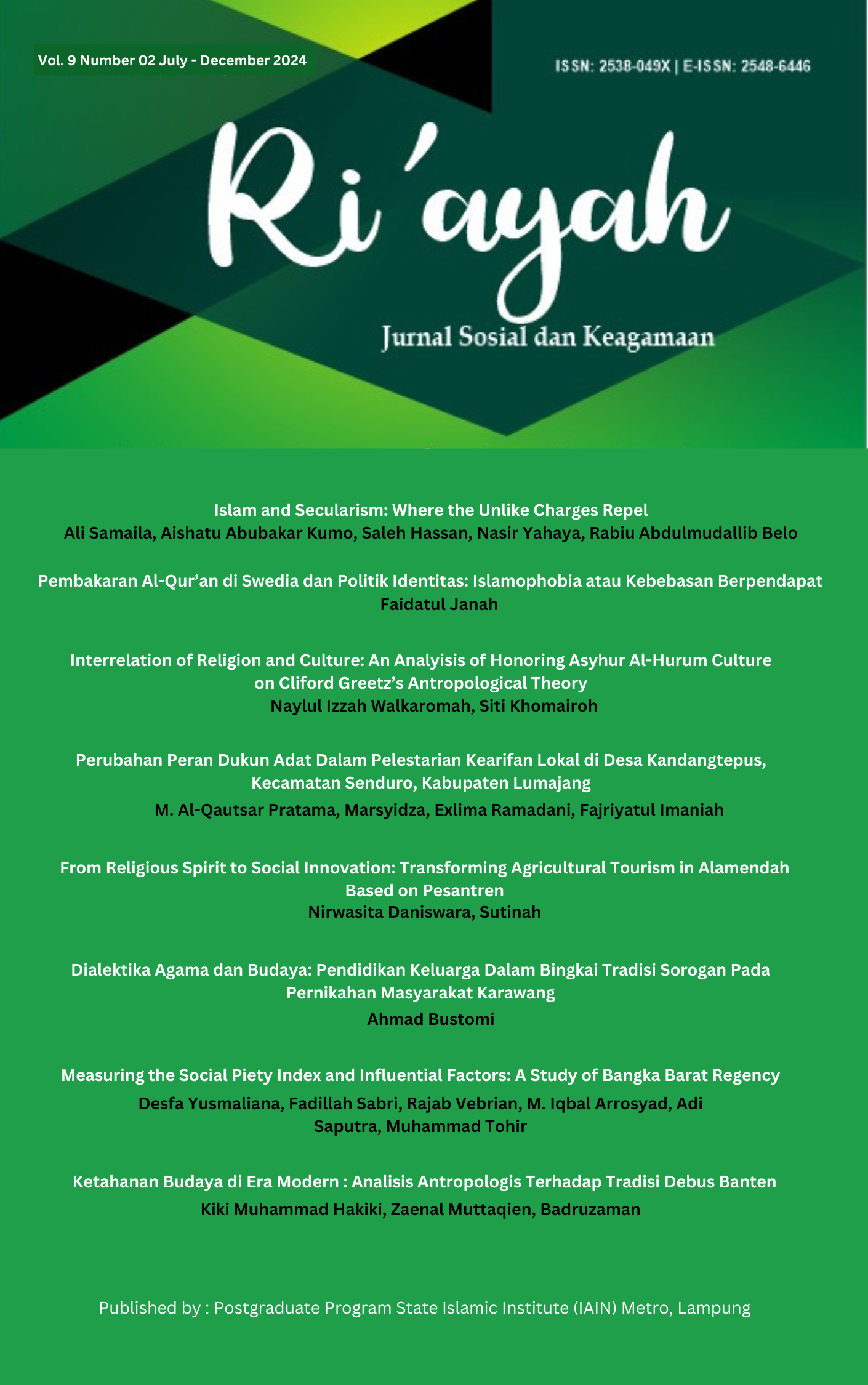Ketahanan Budaya di Era Modern: Analisis Antropologis Terhadap Tradisi Debus Banten
DOI:
https://doi.org/10.32332/g6s4yv58Keywords:
Debus; Pelestarian Budaya; Adaptasi Budaya; Modernitas; Generasi MudaAbstract
Today, Banten's Debus Tradition faces many problems. The process of urbanization, globalization, and the transformation of social values have increased the pressure on this traditional practice. The focus of this research is to uncover the ways the Banten Debus community preserves and adapts itself when facing problems. Evaluating the various methods of preservation and adaptation is the main objective of this research. In addition, this research shows how important government policies, community initiatives and the participation of the younger generation are. Using participatory observation, in-depth interviews, and document analysis, this study collected thorough data on the current state of Debus. The results show that incorporating Debus into the local content material of the school curriculum, securing financial and logistical support, and encouraging it through digital media are crucial for its sustainability. In addition, there are great possibilities to revive interest in the Debus tradition through the active engagement of the younger generation in Debus through digital platforms and social media. This study found that in order to preserve and develop Debus sustainably, a multifaceted approach involving collaboration between community members, cultural institutions and the government is essential. The results show how important it is to use adaptive strategies to maintain cultural heritage when modernization is taking place.
Downloads
References
Andrew, Divinah. “The Impact of Globalization on the Traditional Religious Practices and Cultural Values: A Case Study of Kenya.” International Journal of Culture and Religious Studies 4, no. 2 (2023): 1–12. https://doi.org/10.47941/ijcrs.1345.
Arsaliev Shavadi. “Social & Behavioural Sciences SCTCMG 2018 International Scientific Conference « Social and Cultural Transformations in the Context of Modern Globalism » Ethno Pedagogical Technologies In Regional.” The European Proceedings of Social & Behavioural Sciences, 2019, 0–5. www.FutureAcademy.org.UK.
Calasanza, Yosef. “Pelestarian Kesenian Debus Banten Di Padepokan Maung Pande.”
SASDAYA: Gadjah Mada Journal of Humanities 7, no. 1 (n.d.): 1–14.
David, Cumin. Ritual. Oxford Research Encyclopedia of Religion, 2022. https://doi.org/10.1093/acrefore/9780199340378.013.923.
Falkingham, L T, and R Reeves. “Context Analysis—A Technique for Analysing Research in a Field, Applied to Literature on the Management of R&D at the Section Level.”
Scientometrics 42, no. 2 (1998): 97–120. https://doi.org/10.1007/BF02458351.
Hakiki, Kiki Muhamad. “Debus Banten: Pergeseran Otentisitas Dan Negosiasi Islam-Budaya Lokal.” Kalam 7, no. 1 (2013): 1–20.
Hermanto, Lambok S, K Aditya, H Barik, and Kerin A. “Debus Banten: In Between Myth, Belief, And Culture.” MOMENTUM Jurnal Sosial Dan Keagamaan 10, no. 2 (2021): 138–57. https://www.bantenprov.go.id/profil-provinsi/kebudayaan.
Hudaeri, Mohamad. Debus Dalam Tradisi Masyarakat Banten. Serang: FUD Press, 2009.
———. “Tasbih Dan Golok.” Alqalam 20, no. 98–99 (2003): 141. https://doi.org/10.32678/alqalam.v20i98-99.639.
Humaeni, Ayatullah. “The LocaL Tradition of Magical Practices in Banten Society.” El- HARAKAH, 14, no. 1 (2012): 69–87. https://doi.org/10.18860/el.v0i0.2195.
Jelytha Ningrum, Anindha, Raden Nita, Yulia Fatimah, Mei Krismonica Sianturi, Ellisya Taskiyah, Khairunnisa Karimah, Erangga Adi Putra, Adi Abdillah, and Willy Kristantio Desmonda. “The Roll of Mass Media in Influencing Popular Culture.” International Journal of Advanced Multidisciplinary Research and Studies 4, no. 4 (2024): 145–49. https://doi.org/10.62225/2583049x.2024.4.4.3015.
Kai Oppermann, Alexander Spencer. Narrative Analysis ( Routledge Handbook of Foreign Policy Analysis Methods). Routledge, 2022.
Khoirunisa Wahida, Hoirul Uyun, and Didit Kurniawan Wintoko. “Efek Globalisasi Yang Dihadapi Masyarakat Kontemporer Terhadap Perekonomian.” Harmoni: Jurnal Ilmu Komunikasi Dan Sosial 1, no. 1 (2023): 01–12. https://doi.org/10.59581/harmoni- widyakarya.v1i1.288.
Maha Putra, I Nyoman Gede. “Transformation of Traditional Settlements and Disaster Vulnerability.” Journal of Architectural Research and Education 2, no. 1 (2020): 100. https://doi.org/10.17509/jare.v2i1.22076.
Marie, S. “Multimodal Discourse Analysis of Indigenous TikTok Videos,” 2024.
McCreery, M. P., Head, D. L., Krach, S. K., Leif, S. A., & Fiorentini, J. P. Data-Triangulation Through Multiple Methods: The Case for Stealth Assessment (Handbook of Research on Digital-Based Assessment and Innovative Practices in Education). Edited by J. Keengwe. IGI Global, 2022. https://doi.org/https://doi.org/10.4018/978-1-6684-2468-1.ch005.
Mubarok, Ramadhani Al, Damanhuri, and Qotrun Nida. “Minat Pemuda Terhadap Pelestarian Seni Budaya Debus Banten.” MENDIDIK: Jurnal Kajian Pendidikan Dan Pengajaran 10, no. 1 (2024): 80–84. https://doi.org/10.30653/003.2024101.91.
Muhamad Yusuf Sulaeman, Hidayatullah Haila & Ila Rosmilawati. “Strategi Pembelajaran Seni Debus Dalam Rangka Pelestarian Budaya Lokal Di Padepokan Terumbu Banten.” Jurnal Eksistensi Pendidikan Luar Sekolah (E-Plus) 4, no. 1 (2019): 1–23. https://doi.org/http://dx.doi.org/10.30870/e-plus.v4i1.6280.
Musofa, Ade. “Pergeseran Relasi Antara Tarekat Dan Debus Dalam Kesenian Debus Banten.” Jogjakarta: Fakultas Ushuluddin UIN Jogjakarta, 2007.
Ribawati, Eko, Muhammad Anggie Farizqi Prasadana, Yuni Maryuni, Tubagus Umar Syarif Hadi Wibowo, Ana Nurhasanah, Arif Permana Putra, and Rizka Fauzan. “Melestarikan Tradisi, Merawat Ingatan: Sosialisasi Kesenian Debus Banten Pada Himpunan Mahasiswa Pendidikan Sejarah (Himadira) FKIP Untirta.” Jurnal Bumi Raflesia 6 (2023): 269–72.
Rohman. “The Result of A Holy Alliance: Debus and Tariqah in Banten Province.” Afkaruna
, no. 1 (2013): 1–5. https://doi.org/10.18196/aiijis.2013.0015.1-5.
. “Negotiating Islam: A Study on the Debus Fatwa of the Indonesian Council of Ulama in Banten.” Islamic Studies Review 2, no. 1 (2023): 96–119. https://doi.org/10.56529/isr.v2i1.119.
Said, Hasani Ahmad. “Islam Dan Budaya DI Banten: Menelisik Tradisi Debus Dan Maulid.”
Kalam 10, no. 1 (2016): 109–40.
Saifullah, Saifullah, Saleh Nur, and Dasman Yahya Maali. “ANTARA DEBUS BANTEN DAN DEBUS PARIAMAN Unsur-Unsur Tariqat Dalam Tradisi Debus.” Nusantara; Journal for Southeast Asian Islamic Studies 19, no. 1 (n.d.): 30–44.
Setiadi, Yudi. “Ayat-Ayat Al- Qur’an Dalam Pementasan Debus.” Ushuluna: Jurnal Ilmu Ushuluddin 5, no. 1 (2019): 60–82.
Siti Solehah, Ujang Jamaludin, Dinar Sugiana Fitrayadi. “Nilai-Nilai Budaya Pada Kesenian Debus (Suatu Pendekatan Studi Etnografi Budaya Banten).” Journal of Civic Education 5, no. 2 (2022): 212–22.
Squires, Vicki. “Thematic Analysis BT - Varieties of Qualitative Research Methods: Selected Contextual Perspectives.” edited by Janet Mola Okoko, Scott Tunison, and Keith D Walker, 463–68. Cham: Springer International Publishing, 2023. https://doi.org/10.1007/978-3-031-04394-9_72.
Suryadi. “Penerapan Pendidikan Karakter Dan Nilai Religius Siswa Melalui Seni Budaya Debus Banten.” Jurnal Pembangunan Pendidikan: Fondasi Dan Aplikasi 10, no. 1 (2022): 1–8. https://doi.org/10.21831/jppfa.v10i1.48366.
Zaini Miftach. “Revitalisasi Mantra Debus: Penguatan Kearifan Lokal Sebagai Bahan Ajar Sastra Di Sd Ezik.” Pendas : Jurnal Ilmiah Pendidikan Dasar, ISSN Cetak : 2477-2143 ISSN Online : 2548-6950 Volume 09 Nomor 01, Maret 2024 Revitalisasi 09 (2018): 53–







